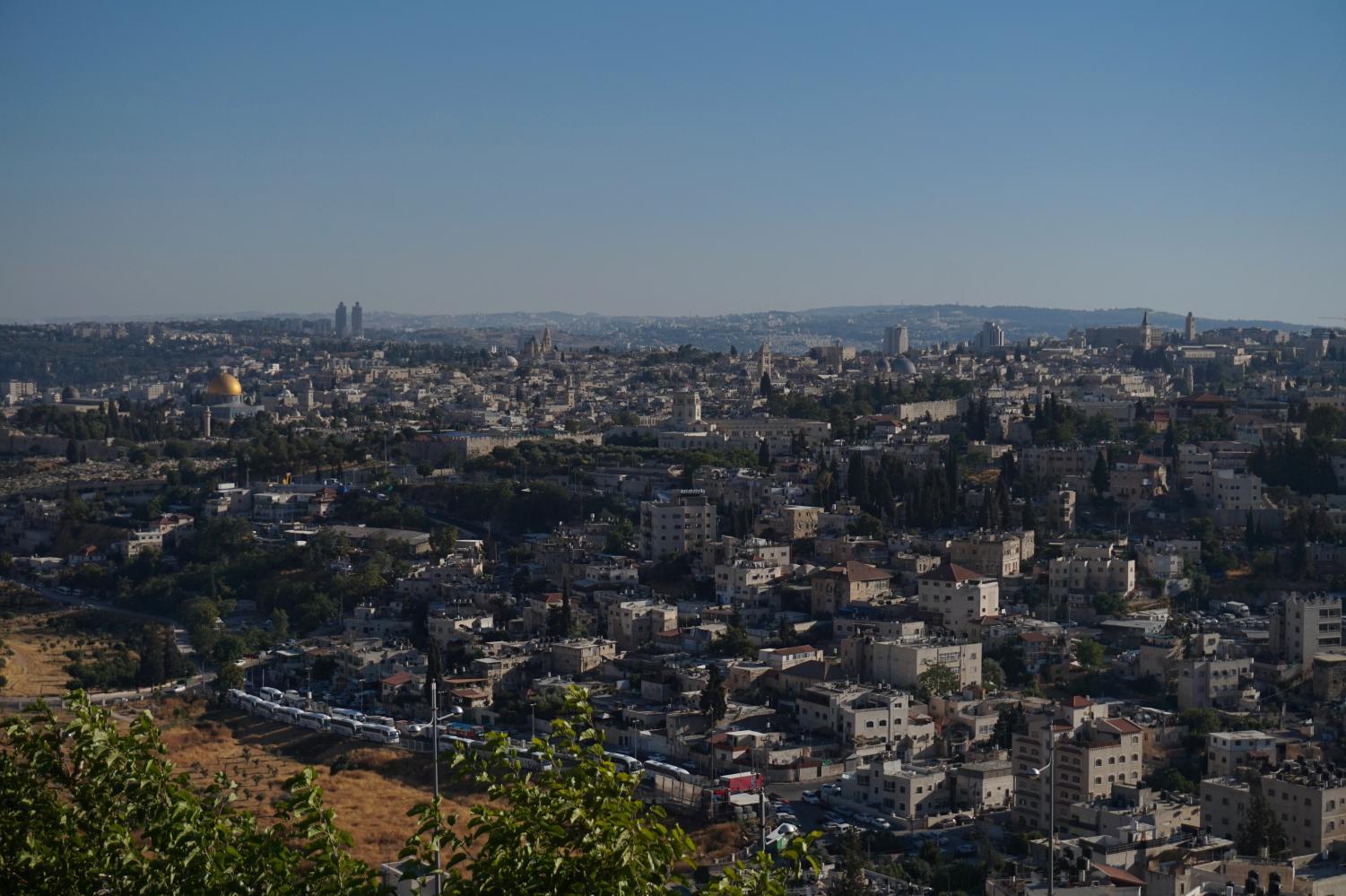Opinion | The rise in left-wing antisemitism is dangerous and unacceptable


My friend told me that she is scared to wear her Star of David necklace outside. People I grew up with are sharing antisemitic posts on Instagram that call Israel every name in the book, compare Zionists to Nazis, say that “Hitler was right” and, worst of all, posts in support of Hamas, the terrorist organization holding Gaza, and the Palestinians within it, hostage.
First, a few statements, as it’s impossible to make touchy arguments like this without establishing that I’m highly critical of the treatment of Palestinians by the Israeli government and far-right groups in Israel — along with most other Israelis. I’m a Jew of color who leans far left politically, has family and friends in the Middle East and was raised close to Middle Eastern culture. I spent hours finding accurate sources for your further reading, but please do not stop here. I sourced this article more than any other article I’ve ever written for The Pitt News, which shows just how deep the problem runs. As antisemites have said since well before the 16th century, never trust the Jews. Trust the sources instead, then.
As a kid, I never understood why the Israeli-Palestinian (IP) conflict was a touchy subject for Americans — they didn’t have family and friends living in the Middle East they needed to be worried about. As an adult witnessing the increase in passionate online activists, who quickly come to the defense of Muslims and Palestinians, I wonder where the same energy is concerning the genocide of Uyghur Muslims in China, the war and famine in Yemen and persistent Islamaphobia in the West, that all received far less attention from activists than Palestinian liberation. I wonder if the Israeli-Palestinian conflict is a touchy subject to Americans because of the antisemitism that runs deep throughout American and world history.
Unbeknownst to most people, only Jews get to say what is antisemitic, antisemitism is one word, Jews are not secretly lizard people, we don’t control the media, most of us aren’t rich or greedy and Jews are not white in the eyes of white supremacists.
The land of Israel has significant religious and cultural meaning. Many Jews are white-passing, but Judaism is an ethnoreligion, meaning most Jews have DNA originating from the Levant — referring to the Eastern Mediterranean region of Western Asia. The Diaspora refers to the many times Jews were forced out of this land. Most people are familiar with Ashkenazi Jews — who fled to Eastern Europe during the Diaspora — but there are Diaspora Jews all over the world that have their own cultures, food, skin colors, customs, ways of practicing Judaism and languages.
Jews account for 2.2% of America’s population, yet are targeted in over half of religious hate crimes. Since the outbreak of violence in Israel and Gaza began two weeks ago, antisemitic hate crimes increased by 438% in the UK alone, with similar trends recorded in America. The number continues to rise even with the ceasefire which started Friday.
All kinds of antisemitism are hard to define — as the “world’s oldest hatred,” it has to evolve constantly to continue to permeate in society. Right-wing antisemitism, associated with Nazism and QAnon, is well known. But left-wing antisemitism is often ignored. Left-wing antisemitism fits well into the online activist narrative of portraying all Jews as “colonizers” or “Zionists.” Antisemitism is a complex hatred of the Jewish people, founded on religious hatred, racism and xenophobia.
Having grown up blocks from the Tree of Life Synagogue, I am no stranger to antisemitism. But the rise in left-wing antisemitism in the last two weeks is deeply disturbing. Many leftists and supporters of Palestinian movements, such as the Boycott, Divestment and Sanctions movement and Jewish Voice for Peace, hold dangerously antisemitic views. The phrase “from the river to the sea, Palestine will be free,” is a statement that is often used in leftist spaces and was featured on a poster for a Palestinian solidarity protest in Oakland. The phrase is a call to the genocide of all Jews.
Identifying bias is an important skill, but learning how to use it to manipulate an audience is an entirely different monster, stitched together with loaded wording, graphic images and videos and an unhealthy dose of omitted and one-sided misinformation. I saw an infographic on Instagram claiming that the IP conflict was about oil, and laughed out loud. I saw another extremely misinformed post claiming that it was about race. Israel has its race problems, but the IP conflict is mostly a dispute over land.
We’re all familiar with the scapegoating of Jews by Hitler for losses sustained in WWI, but scapegoating still appears in many left-wing movements such as the Bolshevik revolution, the Sandinista revolution in Nicaragua, anti-colonialist movements in Algeria and the rise to power of Hugo Chavez in Venezuela. In America today we see scapegoating continue by blaming “Zionists” for police brutality and scapegoating Israel and Jews for spreading COVID-19.
The terms Zionist and Jew are often used interchangeably, and the newest definiton of the word used by leftists — that Zionism uses Jewish suffering to erase the Palestinian experience — is connotated with facism and colonialism. The word Zionist has taken on a lot of meanings, especially in leftist progressive spaces that often don’t make space for Jews with ties to Israel, but the term widely refers to the right to self-determination of Jews. In other words, it means that Israel as a country should exist. Many American Jews, especially on the left side of the political spectrum, will not agree with me that Zionism is an essential part of cultural Judaism.
Leftist Jews in America tend to separate themselves from Zionism, and I never understood why until I stumbled across a fabulous Latina Jewish activist @rootsmetals on Instagram who not only does a serious amount of explaining of history and Judaism in the limited 10-slide platform available to her, but also sources all of her research through her Patreon. In her research on left-wing antisemitism, she explores the topic of a “good” Jew versus a “bad” Jew. The renouncing of attachments to our ancestral homelands and tribes to be welcomed into leftist spaces is nothing new to Judaism — in fact, there are records of it happening as early as during the French Revolution and the Enlightenment. Assimilation and renouncing the uncomfortable parts of one’s culture apparently make one a “good” Jew.
Left-wing antisemitism today is sadly often tacked onto support for Palestinians by blaming both Jews and Israeli citizens for the actions of the Israeli government and far-right parties in Israel. Advocating for Palestinians is important, but to do that, we must condemn every multifaceted source of strife for the Palestinian people, as well as the antisemitism that the movement is prone to breeding due to Hamas. Hamas is a terrorist organization that violently took control over the Gaza Strip in 2007 and is deeply antisemitic. I have seen posts circulating on Instagram that say to talk about Hamas when talking about Palestinian liberation is diverting attention from the real problem, but Hamas has committed many war crimes and human rights violations against Palestinians in the past that still continue today. Much of the money that goes to Gaza for relief often falls into the hands of Hamas and is used to enrich Hamas leadership and fund terrorist infrastructure, rather than providing aid for their own people.
I’m not going to speak on the IP conflict — it’s up to all of you to do your own research, to compare biased sources from both sides to find the facts on the long history of the region. To be frank, after the last two weeks, I’m exhausted. I engage in activism frequently on a variety of topics, away from social media. The activism on this topic has, by far, been the most emotionally draining, as it involves the country I love, my friends and family in very real danger. I can only be an ally to other movements, but this activism is much too close to home.
I learned that shying away from social media activism was for the best after the BLM protests last summer. Reading books about the subject to form your own opinion is far more enjoyable than scrolling through Instagram looking for the perfect infographic to share with people who don’t really care. What’s more, social media activism is exhausting — it consists of educating people that don’t want to listen, and, in the case of the last few weeks, correcting misinformation and trying desperately to convince people that Jews have the right to exist peacefully all over the world, especially in Israel.
The infographic storm that hit social media when the violence began in the Middle East only does more to polarize Palestinians and Jews all over the world, as well as perpetuates antisemitism and Islamophobia. The same friend I mentioned earlier said last week, “Hello activists of Instagram, where are you? I am scared to leave my house. Where are you?” I beg of the Instagram activists, please do your research before you post, and keep in mind that peace is not achieved through bias, hatred and misinformation.
Thousands of Jews and Arabs marched in Tel Aviv, protesting for peace after the ceasefire this week. And there is hope for peace — none called for extremism and hate as the path forward.
Dalia Maeroff writes primarily about issues of psychology, education, culture and environmentalism. Write to her at DAM291@pitt.edu.
Recent Posts
Column | Ryan Borucki’s revival is crucial for Pittsburgh’s bullpen
Two years ago, Ryan Borucki had one of the best stories on the Pittsburgh Pirates.…
Take Madness | Elite Eight: Nate Robinson and DMV regions
Welcome to the Elite Eight! After the first week, the initial field is narrowed down…
Faith’s Findings // The Art of Food
In this edition of Faith’s Findings, staff writer Faith Richardson dives into the riveting movie…
Panthers on Politics // Roundtable on Insurance
In this episode of Panthers on Politics, Ruby, Piper and Josie host a round-table discussion…
Hiring freeze raises staffing concerns for Pitt language departments
As preparation begins for the 2025-26 academic year, Pitt’s language departments face uncertainty amid the…
Pitt workers agree to new one-year contract
Pitt service workers finished negotiating a one-year contract at the beginning of March that included…

